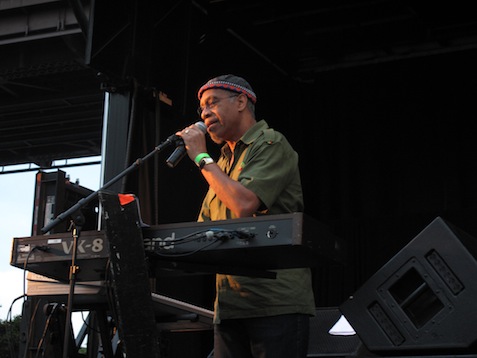War Tears Up the SummerStage at New York’s Queensbridge Park
 Forty-three years after their original 1969 formation, the legendary band War can still rock a stage with the best of them and provide a funky good time for audiences of all ages. Of course, the only original member still in the lineup is keyboardist and current lead singer Leroy “Lonnie” Jordan, but since the band has cycled through more than 25 members since its original inception, this is no surprise. The band, in its current seven-piece configuration, played a free show at Queensbridge Park in Queens, New York, last night as part of City Parks Foundation’s annual SummerStage series. Probably about 400 people, ranging in age from toddlers to elderly folks, were in attendance, and War played an excellent two-hour set full of positive energy and musical prowess.
Forty-three years after their original 1969 formation, the legendary band War can still rock a stage with the best of them and provide a funky good time for audiences of all ages. Of course, the only original member still in the lineup is keyboardist and current lead singer Leroy “Lonnie” Jordan, but since the band has cycled through more than 25 members since its original inception, this is no surprise. The band, in its current seven-piece configuration, played a free show at Queensbridge Park in Queens, New York, last night as part of City Parks Foundation’s annual SummerStage series. Probably about 400 people, ranging in age from toddlers to elderly folks, were in attendance, and War played an excellent two-hour set full of positive energy and musical prowess.
After an hour-long warm-up from DJ Felix Hernandez’ Rhythm Revue, War opened their set with the funky, upbeat “Me and Baby Brother,” from their 1973 gold record “Deliver the Word,” and the already dancing crowd really began to get down. Jordan is an exceptionally charismatic frontman who really commands the stage even when boxed in behind his keyboards, but he stepped out early on in the show to lead an audience sing-along to the 1972 hit “The Cisco Kid.” He joked that if anyone in the crowd could tell him how many other War songs contained the word “wine,” he would let that lucky fan buy him a glass of wine.

Jordan then slowed the upbeat set down a bit with the more serious jam “The World Is a Ghetto,” from the 1972 album of the same name, taking time to speak off-the-cuff about changing the world for the kids in the audience. He referred specifically to an adorable toddler dancing near the stage, of whom he couldn’t quite identify the gender, saying, “They don’t know when they’re that age anyway. Let ’em worry about all that when they get older.” The band also catered to an unexpected fan request by playing the gorgeous, tempo-shifting instrumental “City, Country, City,” also from the “World Is a Ghetto” album, which really gave saxophonist Fernando Harkless and harmonica player Stanley Behrens a chance to shine.
 Though the overall set was mostly very up-tempo and danceable, War took time for a couple of slow love ballads near the end. Jordan took a lengthy vocal and keyboard solo for the beginning of the beautiful 1973 title track “Deliver the Word” before letting the rest of the band join him to jam it out, and drummer Salvador Rodriguez sang a love ballad of his own before War broke out their two biggest hits. On “Why Can’t We Be Friends,” from the 1975 album of the same name, each of the seven members of the band sang one two-bar verse, except for percussionist Marcos Reyes, who relegated the last small verse to an audience sing-along.
Though the overall set was mostly very up-tempo and danceable, War took time for a couple of slow love ballads near the end. Jordan took a lengthy vocal and keyboard solo for the beginning of the beautiful 1973 title track “Deliver the Word” before letting the rest of the band join him to jam it out, and drummer Salvador Rodriguez sang a love ballad of his own before War broke out their two biggest hits. On “Why Can’t We Be Friends,” from the 1975 album of the same name, each of the seven members of the band sang one two-bar verse, except for percussionist Marcos Reyes, who relegated the last small verse to an audience sing-along.
They closed with the iconic hit “Low Rider,” from the same album, and of course the crowd loved it, many of them begging for one more song. Unfortunately, the free outdoor show had a strict ending time, but it is a testament to War’s energy, vitality and long list of beloved hits, that a two-hour set could still leave us wanting more.
You can follow us on Twitter and Facebook for content updates. Also, sign up for our email list for weekly updates and check us out on Google+ as well.
Posted in: Entertainment, Music, News, On Location
Tags: City Country City, City Parks Foundation, concert reviews, concerts, Deliver the Word, Ezra Stead, Felix Hernandez, Felix Hernandez' Rhythm Revue, Fernando Harkless, funk music, gold record, harmonica, harmonica player, keyboard player, Leroy "Lonnie" Jordan, Low Rider, Marcos Reyes, Me and Baby Brother, music, New York, New York City, percussionist, Queens, Queensbridge Park, Salvador Rodriguez, saxophone player, saxophone solos, sing-along, Stanley Behrens, SummerStage, The Cisco Kid, The World Is a Ghetto, War, Why Can't We Be Friends, Wine











